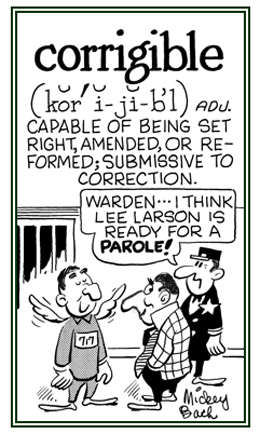corrigible
(adjective), more corrigible, most corrigible
1. Regarding something being corrected, improved, reformed, or set properly: The short story that Mrs. Thompson assigned the students to read had already been put into a
corrigible form in that it was easy to understand and it helped them to increase their vocabulary skills.
2. Referring to something which is susceptible to being reformed or corrected: Jane was still a very young girl making mistakes like little children do, but she was willing to do better and so she was quite the
corrigible child.
3. Etymology: from
corrigere "to make straight, to correct", from
com, "together" +
regere, "to make straight, to lead, to guide, to conduct".
 © ALL rights are reserved.
© ALL rights are reserved.
Go to this Word A Day Revisited Index
so you can see more of Mickey Bach's cartoons.
counteract
(verb), counteracts; counteracted; counteracting
1. To oppose and to mitigate the effects of something by contrary action; to check: Doug and his family are planning some practical measures to counteract the high costs of gas for their car, like driving less or even selling their car!
2. To prevent something from having an effect, or to lessen its effect; to offset: The medicine that Jack took was supposed to counteract the tiredness he was experiencing.
counteraction
(s) (noun), counteractions
(pl)
1. A measure intended to nullify the effects of some previous measure: Without any counteraction, Tom's financial problems with lavish spending will get worse and worse!
2. Am action to make ineffective, to restrain, or to neutralize the usually ill effects of something: A counteraction can be produced by means of an opposite force, action, or influence.
counteractive
(adjective), more counteractive, Most counteractive
Regarding something that opposes, neutralizes, or mitigates an effect by an opposite action: Enjoying ice cream and cake produce a counteractive effect on going on a diet to lose weight!
counteractively
(adverb), morevcounteractively, most counteractively
Characterizing how an action results in opposition to something else: Little Ivy tried to help her mother with hanging up the laundry, but it was achieved counteractively by causing her mother extra work and taking up so much more time!
counteragitation
(s) (noun), counteragitations
(pl)
A turmoil or turbulence that opposes the disturbance of another person or group: The counteragitation caused by the protesters of one political party fighting against the other rival political party in the city could hardly be controlled by the police.
cutireaction
(s) (noun), cutireactions
(pl)
The inflammatory reaction to an irritant: Jane always had a cutireaction when she used a certain kind of sun screen, causing her skin to become very red and itchy.
dermoreaction
(s) (noun), dermoreactions
(pl)
A cutaneous (skin) reaction: Dr. Snow told Jane to inform him if there was any dermoreaction, like red or itchy skin, when using the new medication he gave her.
disambiguation
(s) (noun), disambiguations
(pl)
The lack of vagueness or uncertainty in communication: The disambiguation of the doctor's orders was absolutely clear and distinct and did not allow for any confusion of how many pills to take and when they were to be taken.
ecoactivist
(s) (noun), ecoactivists
(pl)
One who actively opposes the pollution of, or tries to prevent damage to the living world: An ecoactivist can also be described as an environmental activist or an environmental campaigner.
electrocoagulation, surgical diathermy
(s) (noun): electrocoagulations; surgical diathermies
(pl)
A procedure that uses an electrical current to stop bleeding and to cause destruction of tissue:
Electrocoagulation is a therapeutic destructive form of electrosurgery in which tissue is hardened by the passage of a high-frequency current from an electric cautery device.
Surgical diathermy is a method of sealing blood vessels using heat generated by a high-frequency electric current through fine needles or an electrical surgical knife.
The procedure is used during surgery to close newly cut vessels and it can also be used to stop nosebleeds and to remove vascular deformities.
enact
(verb), enacts; enacted; enacting
1. To make into law: Congress enacted a tax reform bill that was more confusing than before it was passed.
2. To act out a role or part, as on a stage: James enacted the part of a father in the school play.
enactment
(s) (noun), enactments
(pl)
1. The approval of a law by a legislative body: The
enactment of the law proved to be one of great concern to the country.
An enactment is also the legal document codifying the result of deliberations of a committee or society or legislative body.
2. The act or situation of acting the part of a character on stage: An enactment on stage dramatically represents the characters by speech, action, and gestures.
essay
(s) (noun), essays
(pl)
1. A short literary composition on a single subject, usually presenting the personal view of the author: Such an
essay can be a report or composition which is normally written and of moderate length.
Mrs. Smart asked her students to write an essay about their past summer vacation to be due the following day.
2. Something resembling such a composition; An essay can be a written paper on a certain issue or subject, like a photojournalistic essay.
3. An initial attempt or endeavor, especially a tentative attempt: An essay can be described as a serious and conscientious effort to undertake or to accomplish a task.
4. Etymology: from Middle French essai, "trial, attemp"; from Late Latin exagium, "a weighing, a weight"; from Latin exigere, "to weigh, to measture, to examine"; literally "to drive out"; from ex-, "out" + agere with the apparent meaning here of "to weigh".



